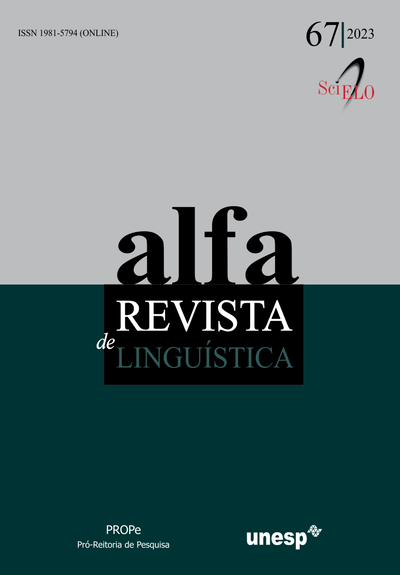The substitutive adversative coordination não x, mas y
a functional discursive analysis to syntactic reduction
DOI:
https://doi.org/10.1590/1981-5794-e15488Keywords:
Adversative coordination, Contrast, Massn, Reduction, Functional Discourse GrammarAbstract
This paper investigates, from the perspective of Functional Discourse Grammar, the substitutive adversative coordination, in which the second coordinated member – and sometimes the first one too – is expressed by phrase or word, as in cê num dá tanto valor ao ídolo, mas à música dele. These structures have received little attention from functionalist studies, with the exception of the Semantics of Argumentation (ANSCOMBRE; DUCROT, 1977; VOGT; DUCROT, 1980). According to the theory adopted here, in these linguistic expressions, there are two related Discursive Acts, the second member of the coordination having a Thetic content frame with one Subact. Semantically, both members constitute Propositional Contents and, ultimately, predications, and the second member presents an Identificational, Classificational or Relational predication frame, formulated in an interaction between the Grammatical and Contextual components. Thus, the second member of the coordination is expressed by only a single phrase or word, as it aims to introduce a single new information (focal), considered important by the Speaker for updating the Addressee’s pragmatic information. We advocate, in line with the adopted theoretical model, that there is no reduction of predication constituents in the second member, but that the phenomenon is the result of mismatch between the pragmatic and semantic levels in Portuguese grammar.
Downloads
Downloads
Published
How to Cite
Issue
Section
License
Copyright (c) 2023 ALFA: Revista de Linguística

This work is licensed under a Creative Commons Attribution 4.0 International License.
Manuscripts accepted for publication and published are property of Alfa: Revista de Linguística. It is forbidden the full or partial submission of the manuscript to any other journal. Authors are solely responsible for the article's content. Translation into another language without written permission from the Editor advised by the Editorial Board is prohibited.

